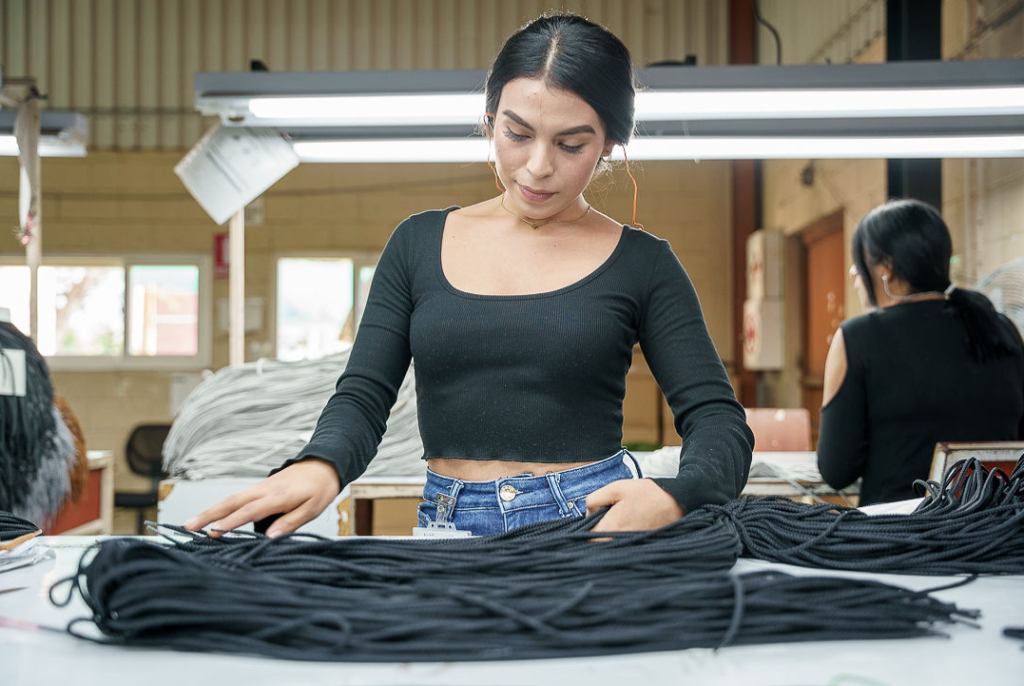Nearshore News: Retail Tensions, Reverse Logistics Growth, Beauty’s Supply Chain Challenges, and Small Biz Survival Strategies

As tariffs continue to ripple through the global economy, their effects are showing up in unexpected ways — from public clashes between retailers and the White House to a surge in refurbished goods. Beauty brands are rethinking how and where they source ingredients, while small business owners face hard decisions in the face of ongoing instability. Today's updates highlight how businesses across the spectrum are adapting (bracing) for whatever comes next.
Nearshore News Summary:
- Trump warns Walmart not to raise prices due to tariffs (Fox Business)
- With demand for affordable products rising, reverse logistics companies like ReturnPro are thriving by reselling and refurbishing returned goods (NYT)
- Tariffs disrupt beauty supply chains, forcing brands to rethink sourcing and innovation (Vogue Business)
- Small business owners delay launches, cut SKUs, and prepare for difficult decisions as they navigate an unstable trade environment (NYT)
Trump warns Walmart to 'eat the tariffs' instead of raising prices
Published: May 17, 2025
Source: Fox Business
President Trump publicly warned Walmart not to raise prices due to tariffs, urging the retailer to “eat the tariffs” instead. Walmart responded that while it’s committed to keeping prices low, the scale of the tariffs — even after recent reductions — is putting significant pressure on its narrow margins.
Key points:
- Trump Criticizes Walmart Over Tariff-Linked Price Hikes: President Trump posted on Truth Social, demanding that Walmart absorb tariff-related costs. He accused the company of using tariffs as an excuse and warned he and customers would be watching closely.
- Walmart Defends Its Position, Citing Financial Realities: Walmart said it would continue doing everything possible to keep prices low but noted that absorbing the full impact of tariffs is challenging given the narrow margins typical in retail. The company reported strong Q1 earnings but warned that price hikes could start as soon as late May.
- Tariff Reductions Still Present Challenges: Despite the U.S. reducing the “de minimis” tariff on low-value Chinese goods from 120% to 54% and bringing broader tariffs down from 145% to 30%, Walmart executives say the speed and magnitude of tariff changes are unprecedented and difficult to manage.
- Walmart’s Supply Chain Still Tied to Global Markets: While nearly two-thirds of Walmart’s U.S. spending is domestic, the rest is still vulnerable to trade policy shifts. These pressures are especially challenging in higher-margin categories like electronics and home goods.
- Company Outlook and Strategy Amid Uncertainty: Walmart remains optimistic, forecasting 3.5% to 4.5% net sales growth in Q2, with e-commerce showing strong performance. However, it warned that fluctuating trade conditions make short-term forecasting highly uncertain.
A Trade War Winner? The Booming Business of Returned Products.
Published: May 15, 2025
Source: New York Times
As U.S. retailers cut back on new imports amid tariffs, reverse logistics companies like ReturnPro are thriving by reselling and refurbishing returned goods. With demand for affordable products rising, refurbished inventory is filling gaps in supply chains and offering a growing business opportunity.
Key points:
- Tariffs Fuel Demand for Refurbished Goods: With tariffs driving up costs on Chinese imports, retailers are reducing orders or canceling them entirely. Companies like ReturnPro, which refurbish and resell returned goods, are stepping in to meet the demand for affordable inventory.
- ReturnPro’s Expanding Role in the Supply Chain: ReturnPro handles goods from major retailers such as Walmart and Bass Pro Shops, sorting and reselling returns through platforms like VIP Outlet and goWholesale. The company expects to process 67 million items this year, with electronics remaining the most valuable category.
- Retailers Seek Cost-Efficient Alternatives: As inventory from overseas slows, retailers are increasingly turning to refurbished stock to avoid higher costs. ReturnPro’s model offers better returns for retailers than liquidation or landfill disposal and supports supply continuity during trade disruptions.
- Surge in Returns Reflects Broader Consumer Trends: A spike in returns can indicate belt-tightening by consumers or poor product-market fit. ReturnPro warehouses are filled with goods like electronics, sports gear, and seasonal items.
- Refurbished Goods Seen as Long-Term Opportunity: The resale market is benefiting from changing consumer attitudes and economic volatility. As CEO Sender Shamiss put it: “Returns aren’t going away anytime soon,” suggesting continued growth for the refurbished goods industry regardless of tariff fluctuations.
How to navigate beauty ingredient sourcing in the age of tariffs
Published: May 16, 2025
Source: Vogue Business
Trump’s recent tariff hikes are disrupting global beauty ingredient supply chains. While some raw materials are exempt, many critical inputs — including popular botanicals and skincare actives — are now subject to steep tariffs, forcing both large and indie brands to adapt or face margin pressure, product delays, and reduced innovation.
Key points:
- Tariffs Are Driving Up Ingredient Costs Across the Beauty Sector: Key ingredients such as vanilla, jasmine, sunflower oil, niacinamide, and hyaluronic acid have seen price increases between 10% and 67% due to tariffs on imports from regions like Madagascar, India, Spain, China, and Israel. Even large corporations like Estée Lauder and Shiseido have warned investors about slower growth and supply chain disruptions.
- Brands Are Reformulating, Delaying Shipments, or Raising Prices: To cope with cost hikes, some brands are reformulating with simpler or local ingredients, while others are delaying shipments or increasing prices. For instance, Wildcraft raised prices by $1–$2, and Glow Mood plans a 66% price jump on body lotion due to a single thickening agent’s cost spike.
- Tariffs Threaten Innovation and Indie Brand Viability: Experts warn that rising costs and logistical uncertainty will stifle innovation, especially for emerging and niche brands that rely on globally sourced, next-gen ingredients. With margins narrowing, some companies may halt R&D or scale back product development altogether.
- Biotech Ingredients Are Emerging as a Resilient Alternative: Brands like Glow Hub and XJ Beauty are turning to biotechnology to produce lab-grown versions of actives like squalane and peptides. These synthetic ingredients offer more stable supply chains and are increasingly seen as a scalable solution to both tariff-related risk and sustainability goals.
- The Industry Faces a Structural Wake-Up Call on Sourcing: The beauty sector’s heavy reliance on single-origin ingredients has left it vulnerable. Experts emphasize the urgent need for geographic and ingredient diversification.
How 4 Business Owners Are Handling Tariffs on China
Published: May 15, 2025
Source: NYT
Although President Trump has temporarily reduced tariffs on Chinese imports from 145% to 30%, small business owners still face serious challenges. With tight margins, limited supplier leverage, and ongoing uncertainty, many are adjusting product lines, delaying launches, and preparing for difficult decisions as they navigate an unstable trade environment.
Key points:
- High Tariffs Still Hurt Small Businesses: Even at 30%, the tariff rate remains historically high and deeply burdensome for small business owners, who lack the negotiating power of large retailers and are unable to absorb additional costs without affecting operations or pricing.
- Footwear Brand Cuts Lower-Cost Items: Marina Rosin Levine of Highline United is scaling back imports of low-margin shoes and focusing on higher-end products priced above $200. Cheaper shoes like $99 Mary Janes are temporarily off the shelves, disproportionately affecting price-sensitive consumers.
- Layoffs and Downsizing Loom: Cheyenne Smith of Dakota Ridge, a children's rain boot company, is considering closing her warehouse and laying off employees despite the tariff easing. She describes the temporary nature of the reprieve as unsettling and unreliable for long-term planning.
- Paused Products, Cautious Restart: Luis Prior of Meavia Toys halted all production due to the initial 145% tariff and is now cautiously restarting select toy manufacturing. However, he’s shelving plans for new product launches due to continued uncertainty about future tariff changes.
- Cost-Sharing as a Temporary Fix: Mike Roach of Paloma Clothing is proposing a shared 10% tariff burden between his store, vendors, and manufacturers to avoid price increases for shoppers. He says such compromises weren’t feasible under the previous 145% rate but are now possible under the temporary reduction.
More blogs


